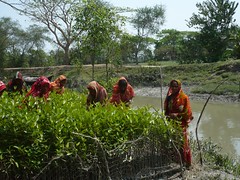Adaptation in the field in Bangladesh
Reports coming in from the field trips by delegates to see adaptation in practice. Bettina Koelle reports:
"After spending the night in Bhola town, we boarded speed boats to travel up the often narrow channels that form the way to Char Kukri Mukri.
Established only some 50 years ago, the island’s community face a number of challenges in their already difficult lives, including more frequent and intense cyclones and the huge tidal surges that come with them. These tidal surges often flood the entire island, taking people, homes and livestock with them. After the flooding, the challenge of salinity on the arable lands remains, preventing the local farmers from planting fruit or vegetable trees.
Adapting to change
The local community is adapting to these challenges in many ways. For example, supported by the UN Development Programme (UNDP) and various government departments, it has built a cyclone shelter, raised above ground, that can house up to 600 people in the event of a cyclone or tidal wave. The shelter, which includes solar power and internet access, also functions as a home for the local administration. An early warning system including SMS and local communication ensures that everybody can reach the cyclone shelter in time.
Another way in which the community is adapting to change is by stabilising the land and increase sedimentation. Again supported by the UNDP and national government, the community has established a nursery for mangrove seedlings of a pioneer species. The nursery project employs women and so is also creating much-needed jobs.
Another adaptation shown to us was presented as the ‘FFF approach’. It combines Forest, Fish and Fruit farming using a newly-developed mound-ditch system that aims to stabilise the soil on the mangrove islands while also increasing incomes for members of the local community.
I am deeply impressed by the way people living in these remote and fragile ecosystems are fiercely determined to adapt to extreme conditions and climate variability and change and highly creative in finding ways to do so. And I am returning to Dhaka and the rest of the conference with both admiration and respect for the people living on the mangrove islands close to the Bay of Bengal."
This guest post was written by Bettina Koelle, director of the nongovernmental organisationIndigo development & change, South Africa.
blog comments powered by Disqus




